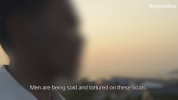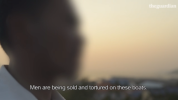Shrimp and prawns sold in US and UK produced by slave labor in Thailand
After you watch the 18-minute video below, or read the article about it in the Guardian, you may stop eating shrimp and prawns—at least those sold at places like Walmart, Carrefour, Costco and Tesco, and the supermarkets Morrisons, the Co-operative, Aldi, and Iceland. Those are some of the places that, after a six-month investigation by the paper, are implicating in human trafficking by buying shrimp fed on slave-produced fishmeal.
We all know about sweatshops producing computers and clothing in Southeast Asia, but this is worse, for it's trueslavery. Immigrants to Thailand, often from Burma, are dumped on trawlers to work off the costs of their migration, and often don't see land again for over a year. On the boats they're treated horribly: they get a plate or so of rice a day, have to work more than 20 hours catching "trash fish" for the fishmeal, and are beaten—or worse:
Life on a 15-metre trawler is brutal, violent and unpredictable. Many of the slaves interviewed by the Guardian recalled being fed just a plate of rice a day. Men would take fitful naps in sleeping quarters so cramped they would crawl to enter them, before being summoned back out to trawl fish at any hour. Those who were too ill to work were thrown overboard, some interviewees reported, while others said they were beaten if they so much as took a lavatory break.
Many of these slave ships stay out at sea for years at a time, trading slaves from one boat to another and being serviced by cargo boats, which travel out from Thai ports towards international borders to pick up the slave boats’ catch and drop off supplies.
. . . Of the 15 current and former slaves the Guardian interviewed during the investigation, 10 had witnessed a fellow fisherman murdered by his boat captain or net master.
Ei Ei Lwin, the Burmese fisherman, claims he saw “18 to 20 people killed in front of me”.
“Some were shot, others were tied up with stones and thrown into the sea, and one was ripped apart,” he says. “He hated his captain and tried to beat him to death. But the captain escaped by jumping into the sea. The other captains came and pinned [the fisherman] down. Then they tied up his hands and legs to four separate boats and pulled him apart.”
The whole system is riddled with corruption: the Thai government knows about it yet does nothing about it, and likewise with the Western food firms that purvey the product. It's deeply disturbing.
It's all documented in the article linked above, but if you're the visual type, watch this video, which you can see by clicking on the screenshot below (note, some of the stuff depicted in this documentary is pretty horrible):

If you want to complain, just click on the links below to go to the customer service site; all these firms are, according to theGuardian, involved in supporting slavery:
After you watch the 18-minute video below, or read the article about it in the Guardian, you may stop eating shrimp and prawns—at least those sold at places like Walmart, Carrefour, Costco and Tesco, and the supermarkets Morrisons, the Co-operative, Aldi, and Iceland. Those are some of the places that, after a six-month investigation by the paper, are implicating in human trafficking by buying shrimp fed on slave-produced fishmeal.
We all know about sweatshops producing computers and clothing in Southeast Asia, but this is worse, for it's trueslavery. Immigrants to Thailand, often from Burma, are dumped on trawlers to work off the costs of their migration, and often don't see land again for over a year. On the boats they're treated horribly: they get a plate or so of rice a day, have to work more than 20 hours catching "trash fish" for the fishmeal, and are beaten—or worse:
Life on a 15-metre trawler is brutal, violent and unpredictable. Many of the slaves interviewed by the Guardian recalled being fed just a plate of rice a day. Men would take fitful naps in sleeping quarters so cramped they would crawl to enter them, before being summoned back out to trawl fish at any hour. Those who were too ill to work were thrown overboard, some interviewees reported, while others said they were beaten if they so much as took a lavatory break.
Many of these slave ships stay out at sea for years at a time, trading slaves from one boat to another and being serviced by cargo boats, which travel out from Thai ports towards international borders to pick up the slave boats’ catch and drop off supplies.
. . . Of the 15 current and former slaves the Guardian interviewed during the investigation, 10 had witnessed a fellow fisherman murdered by his boat captain or net master.
Ei Ei Lwin, the Burmese fisherman, claims he saw “18 to 20 people killed in front of me”.
“Some were shot, others were tied up with stones and thrown into the sea, and one was ripped apart,” he says. “He hated his captain and tried to beat him to death. But the captain escaped by jumping into the sea. The other captains came and pinned [the fisherman] down. Then they tied up his hands and legs to four separate boats and pulled him apart.”
The whole system is riddled with corruption: the Thai government knows about it yet does nothing about it, and likewise with the Western food firms that purvey the product. It's deeply disturbing.
It's all documented in the article linked above, but if you're the visual type, watch this video, which you can see by clicking on the screenshot below (note, some of the stuff depicted in this documentary is pretty horrible):

If you want to complain, just click on the links below to go to the customer service site; all these firms are, according to theGuardian, involved in supporting slavery:




